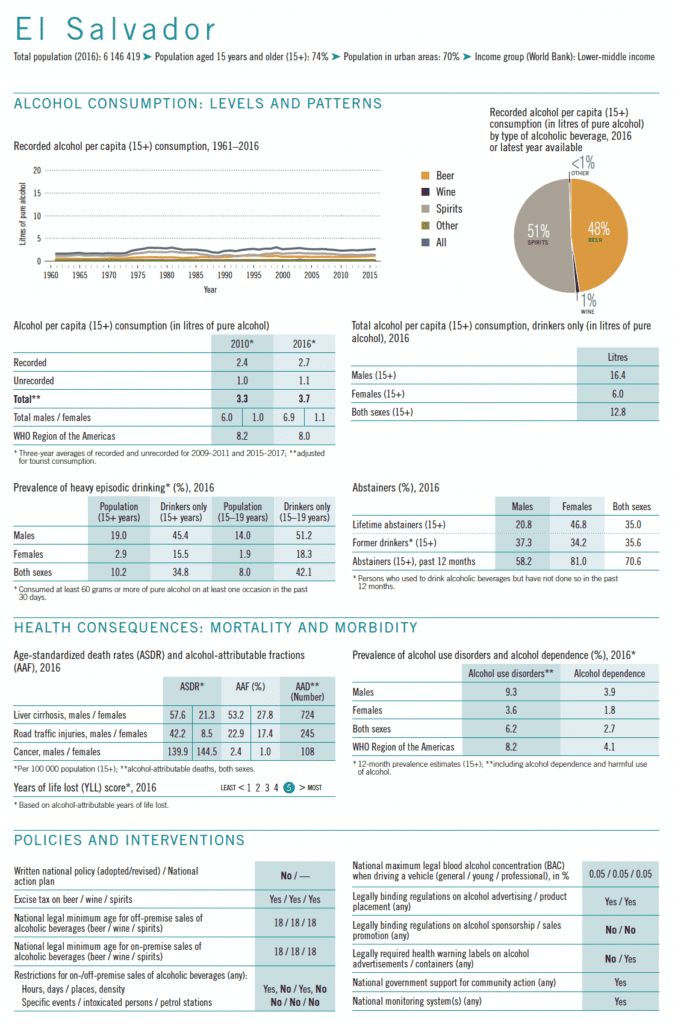The investigation showed worrying statistics on the consumption of alcoholic beverages in young people between the ages of 13 and 17, which reached 9.8%. Youth alcohol use and related harm has increased during the COVID-19 pandemic.
The survey was conducted by the National Institute of Health (INS). Mr Xochitl Sandoval, director of the INS presented the results with health officials and international organizations. The survey included 6,841 households, gathering data from a population of 11,269 people. The data collection took place in November 2022.
Youth alcohol use in El Salvador
The data reveal a worrying picture:
- 5.7% of young people between the ages of 13 and 17 said they had consumed alcohol in the past year.
- 1.9% of youth said they consumed alcohol in the last month.
- 9.8% of young people between 13 and 17 years of age reported using alcohol daily.
This survey finding worries parents, communities, and public health official because early onset of alcohol use drives greater alcohol harm later in life.
Before the pandemic, alcohol use in young people was lower and different.
Alcohol harm is a societal problem
The report entitled “El Salvador, National Report 2021 on the drug situation” confirmed that alcohol harm is a serious problem in the country.
In 2020, the health system attended to 8,463 cases of mental and behavioral disorders due to psychoactive substances. 88.8% of these cases were due to alcohol.
Alcohol harm places a heavy burden on the healthcare system in El Salvador.
The World Health Organization (WHO) ranks El Salvador among the countries with the highest rate of years of life lost due to alcohol. While the majority of adults lives alcohol-free (70%), alcohol use disorder is highly prevalent among men in El Salvador (9.3%).
The WHO country profile also illustrates the lack of evidence-based alcohol policy solutions, such as a national alcohol strategy or action plan. Across the alcohol policy best buys, El Salvador has gaps, with flawed alcohol availability regulation, for instance. Experts and authorities emphasize the evidence that the free sale of alcohol drives easy and wide alcohol availability and thus puts children and youth in harm’s way.
El Salvador has the chance to better protect society in general and young people in particular from alcohol harm by implementing the WHO SAFER alcohol policy blue print.
“SAFER” is an acronym for the five most well-proven, cost-effective and high-impact solutions to prevent and reduce alcohol harm:
Strengthen restrictions on alcohol availability
Enacting and enforcing limits on commercial or public availability of alcohol through laws, policies, and programmes are important ways to prevent and reduce harm due to alcohol.
Such strategies provide essential measures to prevent easy access to alcohol by young people and other vulnerable and high-risk groups.
Advance and enforce alcohol-impaired driving counter measures
Road users who are impaired by alcohol have a significantly higher risk of being involved in a crash.
Enacting and enforcing driving under the influence (DUI) laws and low blood alcohol concentration limits via sobriety checkpoints and random breath testing are proven solutions.
Facilitate access to screening, brief interventions and treatment
Health professionals have an important role in helping people to reduce or quit alcohol use to reduce health risks.
Health services have to provide effective interventions for those in need of help and their families.
Enforce bans on alcohol advertising, sponsorship, and promotion
Bans and comprehensive restrictions on alcohol advertising, sponsorship and promotion are impactful and cost-effective alcohol policy solutions.
Enacting and enforcing bans on exposure to them in the digital world will bring public health benefits and help protect children, adolescents and abstainers from the pressure to start consuming alcohol.
Raise prices on alcohol through excise taxes and pricing policies
Alcohol taxation and other pricing policies are the most high-impact, well-proven, and cost-effective alcohol policy solutions.
An increase in excise taxes on alcoholic beverages is a proven measure to reduce harm due to alcohol and it provides governments revenue to offset the economic costs caused by alcohol.
